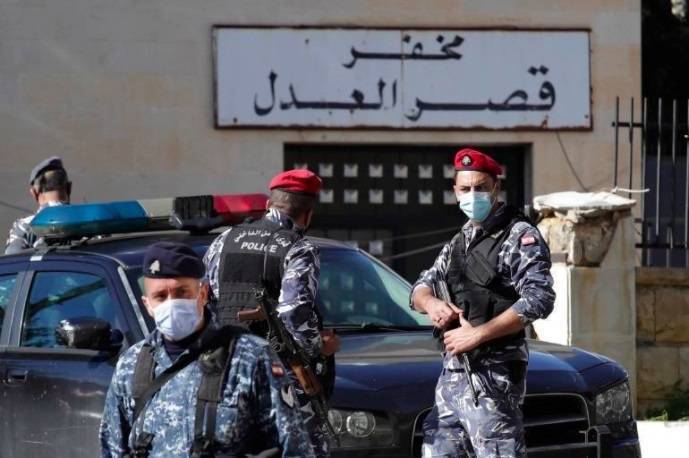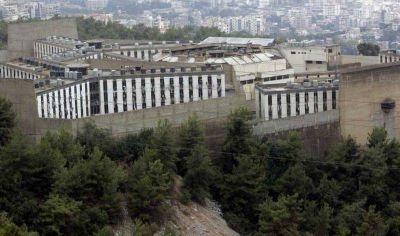
Lebanese Internal Security Forces officers in front of the Beirut Justice Palace. (Credit: Hassan Ammar/AFP/File photo)
BEIRUT — Lebanon has come under scrutiny from various human rights organizations for its lack of progress in addressing the issue of torture by security officials, despite passing an anti-torture law more than five years ago.
Nine organizations, including Human Rights Watch (HRW), issued a joint statement Monday urging Lebanese authorities to enforce Lebanon's Anti-Torture Law effectively.
The statement highlighted specific cases of torture and ill-treatment, the failure to implement the law fully, and violations of Lebanon's international obligations.
Key takeaways from the statement:
Lack of implementation of Anti-Torture Law: Despite the enactment of Law No. 65/2017, which criminalizes torture, the joint statement said that Lebanese authorities have not fully implemented the law. The government appointed members to the National Preventative Mechanism against Torture in 2019, but implementation decrees necessary for the mechanism to begin its work have yet to be adopted.
Inadequate investigation and prosecution: The case of Bashar Abed Al-Saud, a Syrian refugee who died in September 2022 after alleged torture by Lebanon's State Security, exemplifies the lack of progress, the joint statement said. The complaint was referred to the military judiciary instead of civilian courts, contrary to the provisions of the Anti-Torture Law. While indictments were issued, the case remains pending, and the military court maintains jurisdiction.
The report underlined another case, in which "the public prosecutor in Beirut dismissed a torture complaint," on Jan. 11, 2022, "lodged by playwright Ziad Itani against members of State Security without providing any explanation, and apparently without conducting a thorough investigation, Itani had been arrested by State Security in 2017 on suspicion of espionage for Israel and reported being subjected to torture. In 2018, a court acquitted him of these charges," the statement added.
Violations of detainee rights: Security services have frequently denied detainees the right to legal representation during preliminary interrogations, in violation of Article 47 of the Code of Criminal Procedure, the statement also said. Physical violence has been reported in some cases, such as in Saud's case.
Sudden deportation of Syrian refugees: The statement also highlighted how the Lebanese army has recently engaged in the sudden deportation of Syrian refugees to Syria, violating Lebanon's obligations under international law, including the principle of non-refoulment. Deportations have occurred without providing access to legal advice or allowing refugees to engage with the UNHCR, the joint statement criticized.
Recommendations
The signatory organizations also made several recommendations to the Lebanese authorities.
Signatories included Association Justice & Mercy (AJEM), Cedar Centre for Legal Studies, Helping Hands Foundation Lebanon, HRW, Khiam Rehabilitation Center for Victims of Torture (KRC), Lebanese Centre for Human Rights (CLDH) and Legal Agenda.
The organizations called on authorities to ensure detainees' rights by granting access to legal representation and medical examinations during preliminary interrogations and respecting pre-trial detention deadlines as outlined in the Code of Criminal Procedure.
"One of the critical matters is that there has been a lack of follow-through in ensuring that complaints have been properly investigated," Lama Fakih, Middle East and North Africa Director at HRW, told L'Orient Today. "This is something that we see across the security apparatus."
"For the law to be meaningful in action, it needs to be more than words on paper," she added.
The joint statement also urged authorities to conduct prompt, independent and impartial investigations into allegations of torture and ill-treatment and refer all torture cases to regular courts, ensuring independent, fair and transparent trials.
The rights organizations also called on Lebanese authorities to cease the sudden deportation of Syrian refugees and allow individuals at risk of deportation to seek legal advice.
The statement called on Lebanon to amend the Anti-Torture Law to align it with the country's international obligations under the UN Convention Against Torture.
Economic crisis impact
The UN Convention Against Torture, to which Lebanon is a signatory, "requires it to implement a National Preventative Mechanism [against torture]," Fakih said. "The judiciary is a critical institution that would be on the front lines for protecting against torture in the country but it’s never been properly set up, funded or given its independence to allow it to exercise its work effectively."
"As the economic situation in the country has also deteriorated, we know as well that conditions of confinement in detention centers in Lebanon have deteriorated significantly which draws more concern," Fakih added.
Earlier in June, an Amnesty International report called on Lebanon's authorities to "urgently prioritize the health of prisoners as deaths in Ministry of Interior-run prisons nearly doubled in 2022 compared to 2018, the year before the ongoing acute economic crisis began."
The report by Amnesty titled, "Instead of Rehabilitation, He Found Death: Deaths in Custody Doubled Amidst Four-Year Economic Crisis," showed that "Ministry of Interior figures shared with the organization paint a stark picture of rising mortality rates as deaths increased from 14 in 2015 to 18 in 2018 and 34 in 2022."
Lack of engagement
"We have seen that Lebanon has not been fully engaging with several UN mechanisms," Fakih told L'Orient Today. "We also saw recently that there have been some communication attempts from a special rapporteur to discuss the independence of judges but the Lebanese government never responded."
"It is important for the Lebanese government to engage with UN institutions," she said, adding that "a very robust Lebanese civil society coalition has been working on a draft law on the independence of the judiciary, which is being debated in a committee in Parliament."
"Unfortunately, we know that there has been a number of amendments to the law which have eliminated some of the provisions that would have ensured its adherence to international standards when it comes to fair trials," Fakih added. "We, and other organizations, are continuing to work with parliamentarians to try to shore up this legislation, which would ensure that judges are selected for their training, their knowledge, and not on the basis of political appointments or connections."
Forces of Change MP Lawyer Melhem Khalaf, who is a member of Parliament's Human Rights Committee, told L'Orient Today that he and other MPs requested "that investigations be conducted around some of the [torture] practices and torture cases, questioning whether these practices are regular, and eventually requesting to know whether the investigations reached any results, we were told that these are internal private investigations and that they cannot be revealed, bearing in mind, however, that these issues should be public."
According to Khalaf, State Security claims to have a special unit concerned with human rights issues but "we have come forward with more than 18 complaints on several torture cases and they were not taken into consideration."
Still, State Security must not be the only entity concerned with human rights issues; the judiciary should also be involved, Khalaf concluded.
Read the joint statement on Lebanon's progress against torture here.
